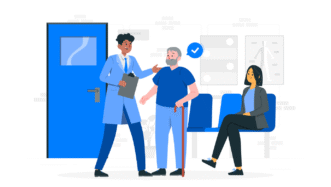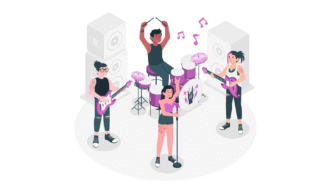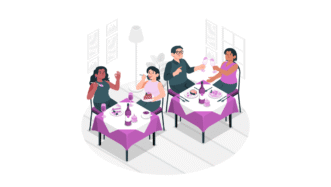LESSON OVERVIEW
The main objectives of this lesson are to:
- talk about facial features;
- practise collocations to describe appearance;
- watch a video on the concept of doppelgängers.
With this lesson, students discuss how they recognise people through their facial features, explore vocabulary to describe people’s appearance (e.g. triangular face, tanned skin, thin lips, etc.) and watch a video about doppelgängers (an unrelated person who looks identical to someone else). They also talk about lookalikes, compare celebrities’ appearances and discuss situations where people were wrongly identified.
B2 / Upper Intermediate60 minStandard LessonPremium Plan
COLLOCATIONS TO DESCRIBE APPEARANCE
As a warm-up, this lesson features an activity where students look at photos of parts of the faces of well-known people and identify them. Then, they answer questions on how they recognise people from facial features. After that, students name as many parts of the face as they can. Next, they form collocations to describe appearance by matching nouns (e.g. eyes, eyebrows, nose, etc.) with adjectives (e.g. round, almond, thick, thin, etc.). Afterwards, students complete the lists of collocations with more adjectives (e.g. narrow eyes, arched eyebrows, flat nose, etc.). Following that, they choose adjectives to describe a famous person in a photo (Rowan Atkinson). Then, students describe another celebrity (Rihanna). Subsequently, they discuss questions about people’s facial features.
VIDEO AND DISCUSSION
In this part of the lesson, students watch a video about doppelgängers. Before watching the video, they choose the correct definition of ‘doppelgänger’. Then, students watch the first part of the video and check their answers. After that, they watch the next part of the video and decide if statements are true or false. They also correct the false statements. Next, students discuss questions about lookalikes and the concept of doppelgängers. Afterwards, they have another chance to practise collocations to describe appearance. Students look at photos of famous people who look alike and do tasks where they identify and compare them. Finally, students look at situations where people were wrongly identified, rank them from the most to the least problematic and explain their choices. Then, they say what might happen next in each case.
HOMEWORK/REVISION
This lesson plan also includes an additional task that you can use as homework or revision. In the task, students find and correct spelling mistakes in sentences. The task is available in the teacher’s version of the worksheet. You can print it and hand it out to your students. It’s also included in the e-lesson plan
WORKSHEETS
Subscribe to unlock these and many other Standalone lesson with the Premium plan
Subscribe













In this lesson, there is a type of intensification, and it’s not revealed until the middle what it will be about. It’s a great topic. As a pre-class activity, I will ask the students to find their own doppelgänger on the internet.
Thank you for the feedback! Asking students to find their doppelgänger as a pre-class activity is a fantastic idea—it sounds like a great way to spark curiosity before diving into the topic. Let us know how it goes!